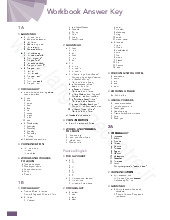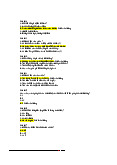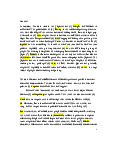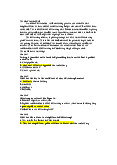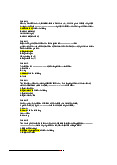






Preview text:
TIẾNG ANH 11 – BRIGHT UNIT 3 TEST 3A
Note: Each correct answer earns 0.2 points.
I. PRONUNCIATION (1 point)
A. Mark the letter A, B, C or D on your answer sheet to indicate the word that differs from
the other three in the position of the main stress in each of the following questions. 1. A. planet B. event C. desert D. water 2. A. worry B. provide C. contain D. destroy 3. A. result B. depend C. damage D. become
B. Mark the letter A, B, C or D on your answer sheet to indicate which word in each
phrase differs from the other three in the position of the primary stress in each of the following questions. 4. A. carbon footprint B. botanical garden C. city centre D. generation gap 5. A. ice cap B. forest fire C. global warming D. climate change
II. USE OF ENGLISH (4.2 points)
A. Mark the letter A, B, C or D on your answer sheet to indicate the correct answer to each of the following questions.
6. Is this the first time you part in a clean-up day? __________ A. take B. took C. are taking D. have taken
7. Factories and vehicles are responsible _________ most of the pollution in the air. A. in B. for C. of D. about
8. The landslide caused _________ damages to the town. A. harmful B. valuable C. heavy D. rising 9. Person A: the solar panel yet? __________
Person B: Yes. They __________ it last weekend. A. Did they install/did B. Have they installed/did C. Did they install/have done
D. Have they installed/have done
10. To make a difference to the Earth’s ecosystems, we need to ________ action now. A. do B. have C. get D. take
11. You can donate clothes that are _________ good condition to charity. A. in B. at C. with D. on
12. I can't find my laptop! Who __________ it without my permission? A. took B. is taking C. was taking D. has taken
13. The council put ________ a tree planting day last week and it was very successful. A. on B. up C. in D. off
14. In our garden, we have got a ________ with fish and frogs in it. A. lake B. pond C. swamp D. grassland
15. Our family __________ an electric car for five years now. A. has B. had C. has had D. is having
B. Mark the letter A, B, C or D on your answer sheet to indicate the word or phrase that is
CLOSEST in meaning to the underlined part in each of the following questions.
16. Deforestation has lead to a serious rise in the number of endangered species. A. nervous B. worrying C. dangerous D. harmful
17. The temperature during the heatwave broke all records. A. was very surprising B. rose above 40 degrees C. has been very hot D. was the highest ever
C. Mark the letter A, B, C or D on your answer sheet to indicate the word or phrase that is
OPPOSITE in meaning to the underlined part in each of the following questions.
18. Plastic pollution harms wildlife and the environment. A. benefits B. cleans up C. recycles D. supports
19. It’s very easy to reuse items like glass bottles and jars. A. decrease B. repair C. get rid of D. destroy
D. Mark the letter A, B, C or D on your answer sheet to show the underlined part that
needs correction in each of the following questions.
20. Last year's fires destroyed hectares of land; luckily, the city council has planted A B C over 200 trees yet. D
21. He hasn’t used plastic bags when he learnt about their effect on the environment. A B C D
E. Mark the letter A, B, C or D on your answer sheet to indicate the correct answer to each
of the following questions.
Save energy! Switch off the
lights when you leave this
22. What is TRUE according to the notice?
A. The lights in the room can help save energy.
B. Leaving the lights on is not energy-efficient.
C. The lights switch on when you enter the room.
D. This room has lights that can switch themselves off. Dear Reader,
The Red Squirrel is an endangered species
in the UK. Can you give a small donation to
build a nature reserve to help save this
important animal? Text HELPRED to 274
and offer £1, £5 or £10. Thank you.
23. What can readers of the advert do?
A. protect a nature reserve that is under threat
B. find out about an endangered species
C. get information about an endangered species
D. choose how much money they want to donate
F. Mark the letter A, B, C or D on your answer sheet to indicate the sentence that best
completes each of the following exchanges.
24. Student A: “What do you suggest we do?” Student B: “_________”
A. OK, we should come up with suggestions.
B. I suppose we can do what you suggest.
C. I'm not sure; organic food costs too much.
D. We should definitely use cloth bags. 25. Student A: “________”
Student B: “I’m not sure about that. Electric cars cost a lot of money.”
A. Right, you could drive your electric car.
B. We could also buy an electric car.
C. Electric cars would reduce our carbon footprint.
D. Let’s make a list of some options for electric cars. 26. Student A: “________” Student B: Yes, of course.
A. How about discussing our ideas?
B. Why spend time writing down our ideas?
C. How could we discuss our ideas? D. What was that like?
III. WORD FORMATION (0.8 points) Write the correct form of the words in brackets.
27. Unfortunately, _________ of both land and marine animals have decreased because of climate change. (POPULATE)
28. Don’t forget to take your _________ cup to the café with you. (USABLE)
29. The environmental group works __________ with the government to achieve its goals. (CLOSE)
30. It was so __________ during the hurricane that many trees fell down. (WIND) IV. READING (3.0 points)
A. Read the following passage and choose the correct word or phrase that best fits each of the numbered blanks.
How to make a building environmentally-friendly
The cost of energy is increasing while global warming is causing more and more damage to
our ecosystems. Many buildings are not good for the environment because they need a lot of
energy to run. For example, they need energy to heat them (31) _____, cool them down and
power almost everything inside. So, how can we make buildings environmentally-friendly,
help the planet and save money all at the same time?
Let’s think about how we can power our homes first of all. How about installing solar panels
on the roof? Solar panels are the cheapest way to create energy. They change sunlight into
electricity which we can use to power our electronic devices and produce hot water. This
means we don’t have to use fossil fuels such as coal, oil and gas which produce a lot of (32) _____ gases.
Now let’s see how we can stop the cold getting in and the heat getting out. Double-glazed
windows have two pieces of glass and they help to stop heat entering or escaping the home.
They cut down on the amount of energy you need to use in the building and help keep it at a
reasonable temperature. This also (33) _____ the amount of carbon emissions we produce
because we don’t need to use as much electricity.
A lot of buildings now use double-glazed windows, but what about solar panels? It (34)
_____ around half a century since they built the first solar-powered building, the ‘Solar
One’. Why haven’t we installed solar panels on all our buildings (35) _____? Knowing their
benefits, what have we got to lose? 31. A. on B. up C. over D. off 32. A. pollution B. carbon C. fossil D. greenhouse 33. A. reduces B. prevents C. avoids D. releases 34. A. is B. was C. has been D. has gone 35. A. already B. just C. ago D. yet
B. Read the passage and choose the correct answer to each of the following questions. Deforestation
We have a beautiful green and blue planet. The oceans cover 71% of it and on 31% of the
land we have forests and jungles. Sadly, we cut around 42 million trees down every day.
Apart from providing homes for animals, these trees actively help the environment,
removing and storing carbon dioxide from the atmosphere. Cutting down huge numbers of
trees in an area is deforestation, but why do people cut down so many?
A lot of deforestation is for wood used in building and to make paper and card products, but
they mostly cut down trees to clear space for farming. 41% of global deforestation takes
place in order to produce beef from farming cows. But this isn’t the only reason. Humans
clear 300 football pitches worth of forest and jungle every hour in order to produce palm oil -
a type of fat that we use to make lots of food products including chocolate.
Global deforestation results in 4.8 billion tonnes of carbon dioxide in the air, which is
terrible news for the environment. However, deforestation isn’t only releasing huge amounts
of greenhouse gases. It is also leaving many animals without a place to live. This is causing
some species such as the orangutan and the Sumatran rhino to face extinction.
Is there anything we do about it when we live so far from the forests and jungles? Yes, there
is. Firstly, we can use recycled paper whenever possible and not waste paper. For example,
not printing things off unless we really need to. We could also stop eating products that
contain palm oil. Small actions by all of us today can save ecosystems tomorrow, and we can
still enjoy our beautiful green and blue home.
36. What is the main idea of the first paragraph?
A. Only land animals are under threat because of losing their homes.
B. Certain human activities damage the environment.
C. Planting trees can stop the effects of global warming.
D. Humans need more green spaces where they live.
37. Why does the author mention football pitches in the second paragraph?
A. to suggest a place for planting palm trees
B. to show ways to save forests and jungles
C. to add one more reason for deforestation
D. to explain how much deforestation occurs
38. Which of the following is NOT true according to the passage?
A. Producing palm oil is bad for the environment.
B. Carbon dioxide is a cause of global warming.
C. Producing meat causes over half of deforestation.
D. There is twice as much water as land on our planet.
39. Which of the following can be inferred from the passage?
A. Farming palm trees affects wildlife more than farming cows.
B. Eating too much meat is bad for the environment.
C. Deforestation is worse than air pollution for the environment.
D. Fewer crops are the main solution to deforestation.
40. Which phrase is closest in meaning to face extinction in the third paragraph? A. lose food and their homes B. disappear from the planet
C. have to move to another place
D. fight each other in order to live
C. Read the following passage. For each of the questions from 41-45, write T if the
statement is TRUE and F if the statement is FALSE. The Plastic Ocean
Plastic pollution is one of the biggest environmental issues the world is facing right now. In
fact, around 8 million tons of plastic waste enters our oceans every year from the coasts and
the rivers. Unlike paper and card, which come from natural products, plastic doesn’t
disappear quickly. It remains in the environment and causes damage for many years.
There is so much plastic waste in our oceans that in 1997, Charles Moore, a boat captain,
discovered a huge collection of rubbish in the Pacific Ocean. He called it the Pacific Garbage
Patch and experts think it is around 1.6 million km2 – just under three times the size of France.
Plastic waste harms wildlife both on land and in the oceans. Animals might eat it or it might
hurt them. For example, sea turtles regularly eat plastic bags because they mistake them for
their favourite snack – jellyfish. Plastic pollution in the seas can also affect humans too,
because fish and small sea creatures may eat small pieces of plastic and then humans eat fish and seafood.
Fortunately, there are things we can do to make a difference right away. We can avoid
single-use plastics such as plastic bags, drinking straws and takeaway cups. Instead, we can
use paper cups and straws and take cloth bags with us when we go shopping. We can also
make sure that we recycle our rubbish and help reduce the amount of plastic entering the
oceans and rivers by regularly taking part in clean-up events. The future of our oceans is in
our hands, so let’s make the right choices now.
41. Paper pollution isn’t as bad for marine wildlife as plastic pollution. _____
42. Scientists named the Pacific Garbage Patch in 1997. _____
43. Sea turtles sometimes think plastic drinking straws are food. _____
44. Plastic pollution from the sea can end up in our stomachs. _____
45. Using recycled items is the only way to stop plastic pollution. _____ V. WRITING (1 point)
A. Rewrite the following sentences without changing their meaning. Use the given word(s) if any.
46. We could organise a neighbourhood clean-up event next weekend. (WHY)
→ __________________________________________________________________
47. The roads last flooded a month ago. (NOT)
→ _________________________________________________________________
48. How long have you worked on your project about air pollution? (WHEN)
→ __________________________________________________________________
B. Rewrite the sentences with the words in the correct order.
49. ever / like / had / jungle / chance / Have / a / visit / you / the / ecosystems / to?
→ __________________________________________________________________
50. volunteers / The / haven't / up / of / yet / the / have / neighbourhood / they / already /
waste;/ picked / most / finished
→ __________________________________________________________________ VI. LISTENING (1 point)
Listen to the conversation and mark each of the sentences as T (true) or F (false).
51. Sam has started his own conservation group. ________
52. Volunteers do all the work in the group. ________
53. Alice enjoyed the last event she went to. ________
54. Sam has tried planting trees before. ________
55. Alice wants to help clean up the local park. ________ Audioscript
Alice: Hi, Sam. What are you doing?
Sam: Hey, Alice. I’m just filling out this membership application for an environmental organisation. Alice: Which one?
Sam: Green Clean - it’s a neighbourhood organisation that helps protect the environment
from pollution and helps keep spaces clean and tidy. They meet up regularly and organise
lots of events with other locals. I heard about if from a friend of mine.
Alice: Cool! I haven’t heard of them though. What do they do exactly?
Sam: They pick up litter and clear up areas such as streets and towns, parks and even
beaches. They also work with local people and businesses to find new ways for them to
recycle their waste. They depend on volunteers, though, to carry out everything.
Alice: Mmm, interesting! I volunteered at a tree-planting day last month and had a great
time. I read about the group online, They were asking for help and I decided to join in. A few
of us met in the local park and worked all morning. It looked great at the end and it’s
something everyone can enjoy, even if they’re just walking in the park and looking at the trees.
Sam: I want to try that some day, too, but right now, I’m interested in volunteering at events
that can help remove pollution from the environment and how we can recycle or reuse unwanted items.
Alice: So when is the next event?
Sam: Actually, there’s a clean-up day at the local park this Saturday to improve the area and install some new rubbish bins. Alice: Rubbish bins?
Sam: Yes, more rubbish bins means less rubbish on the ground and that protects the local
wildlife and make it a nicer place to be. Hey, do you want to come along with me? More volunteers are always welcome.
Alice: Yeah! It sounds great! EXTRA QUESTIONS (1 point)
Mark the letter A. B, C or D on your answer sheet to indicate the option that best
completes each of the following questions. 56. In recent years, . ________ A. the ice caps melted
B. there are more extreme weather events
C. lots of animals are becoming extinct
D. global temperatures have risen 57. your carbon footprint? ________
A. What have you done to prevent B. How do you plan to reduce C. How have you protected D. What are you doing to stop
58. Let's come up with ways ________.
A. to reduce air pollution in our city
B. for reducing their use of plastic
C. helping to stop global warming
D. that we start a recycling project
59. I used public transport in the past; ________.
A. perhaps I could stop driving so often
B. I have to start using public transport
C. however, I have recently started cycling instead
D. now, I take the train instead of driving
60. Our neighbours have built a pond in their garden and ________.
A. their garden now has a lot more wildlife in it
B. the kids would start using the pond straightaway
C. their garden looked so beautiful
D. they haven't planted any flowers around the pond yet
***End – Of – Test***
